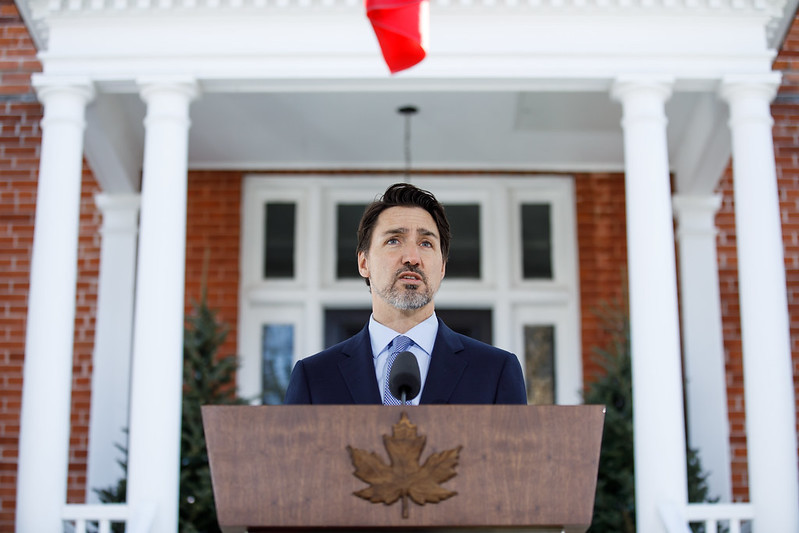When the media asked Prime Minister Justin Trudeau if he would continue to quarantine after his two weeks of self-isolation are complete, Trudeau responded: “I am going to make sure that we continue to follow all recommendations of public health officers.”
This has been a common theme during the COVID-19 crisis in Canada. It’s certainly brought me reassurance, knowing that our elected officials listen to the experts and the science — especially when compared with the choices of the United States administration. When Canadian politicians don’t have the answer, they defer to the people who do.
The policies taken by the government in response to the COVID-19 crisis have been extreme. The Parliamentary Budget Office estimates that in 2020, GDP growth could be -5.1 per cent, the weakest on record since 1962. This compared to the PBO’s November 2019 projection, which expected GDP to grow 1.7 per cent.
The alternative? Well, yesterday, the federal government released for the first time its models, which project 11,000 - 22,000 deaths even if strong measures are followed.
Throughout this crisis, our government has chosen human lives over the economy, and they’ve based hard policy choices on what public health officials and scientists have said.
But this is where my praise of the federal government ends. How can a government that so quickly defers to scientists on COVID-19 at the same time ignore the clear recommendations of scientists when it comes to the very real threat of climate change?
If we think the projections related to COVID-19 are stark, what about the projections surrounding climate change?
The Intergovernmental Panel on Climate Change — a body of the United Nations, made up of the world’s leading scientists — released its damning report in 2018 that warned the world needed to make “rapid, far-reaching and unprecedented” transitions in all aspects of our infrastructure and systems of living. Otherwise, the IPCC predicted, extreme weather events will increase (they already are), and we may even get to the point of runaway climate change.
But what does this mean in practical terms? Well, the IPCC’s report points to the European heat wave of 2003 as an example of what we can expect more of in the future as the effects of climate change worsen.
At least 30,000 people died in that single extreme weather event. There have been many other such disasters. In 2015, India lost an estimated 2,000 people to one of its deadliest heat waves in recent history; Puerto Rico suffered more than 4,500 deaths in the 2017 Hurricane Maria and its aftermath; and the recent Australian wildfires resulted in more than 400 deaths, mainly due to smoke inhalation.
Meanwhile, the World Health Organize estimates that approximately 4.2 million people die every year from outdoor air pollution. So far, more than 70,000 people have died as a result of the coronavirus.
In response to COVID-19, the government really has had to choose human lives over the economy. But in response to climate change, the government could get the best of both worlds: human lives and a better economy.
Sadly, because the effects are less immediate and the causes less direct, the Canadian government continues to choose the “economy” over the environment. When the Liberal government purchased the Trans Mountain pipeline in 2018 from Kinder Morgan, Trudeau repeatedly emphasized the government’s action was in the “national interest” and that international investors expected as much from Canada. The Trans Mountain pipeline is estimated to release 400,000 tonnes of greenhouse gas emissions annually.
In 2017, Trudeau spoke at an energy conference in Houston, Texas: “No country would find 173 billion barrels of oil in the ground and just leave them there.” Fast forward to today, and Canadians can expect to see yet another bail-out of the oil and gas sector, in a matter of “hours, potentially days.” At least that’s what Finance Minister Bill Morneau said on March 25.
And even though it’s less direct and immediate, we do know the numbers. In 2018, a report published in medical journal The Lancet estimated the death of 7,142 Canadians per year due to exposure to air pollution.
Climate change is also linked with increased spread of infectious diseases. Dr. Theresa Tam, Canada’s Chief Public Safety Health Officer — now a staple on our daily news cycle — has long been warning Canadians of the rise of infectious diseases. Vectors like mosquitos and ticks thrive in warmer temperatures, and indeed, from 2009 to 2017 cases of the tick-borne Lyme disease in Canada increased from 150 to 1,500.
Similar to the pressure media is putting on the government now to release COVID-19 numbers, we could be putting similar pressures on the government to release the numbers of projected deaths due to climate change.
Scientists in Canada are still taking a hit from nearly a decade of cuts and suppression by Stephen Harper’s Conservative government. But the Liberal government’s actions in deferring to the scientists on COVID-19 are a hopeful sign.
Maybe this is a turning point for Canada, and maybe the government will begin to take the science-guided action that is required of Canada to meet its international commitments. And, if not, we can point to this time of COVID-19 of a time when the government did listen to the science — and we were better off for it. ![]()
Read more: Coronavirus, Federal Politics, Science + Tech, Environment

















Tyee Commenting Guidelines
Comments that violate guidelines risk being deleted, and violations may result in a temporary or permanent user ban. Maintain the spirit of good conversation to stay in the discussion.
*Please note The Tyee is not a forum for spreading misinformation about COVID-19, denying its existence or minimizing its risk to public health.
Do:
Do not: